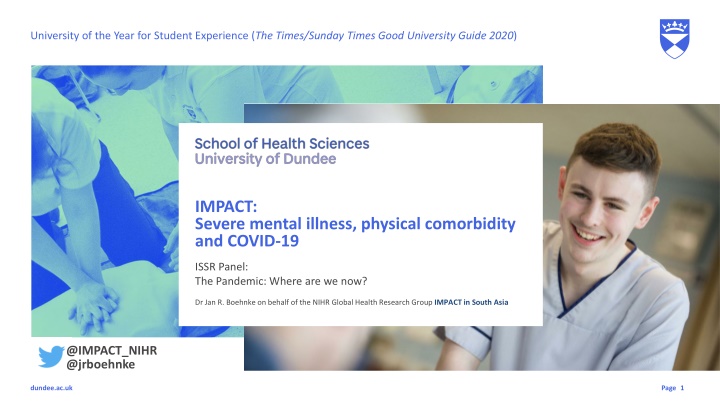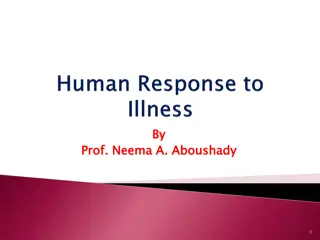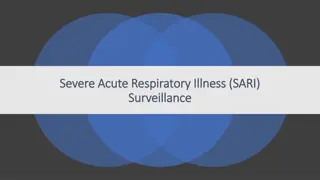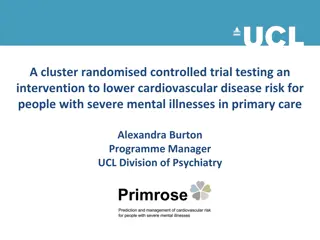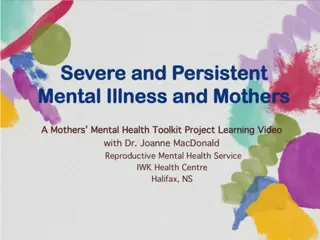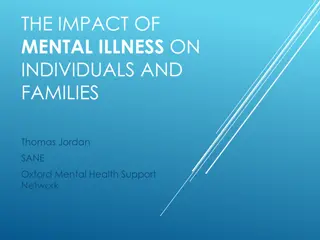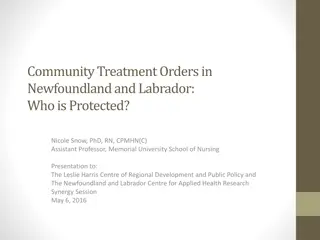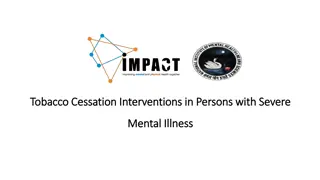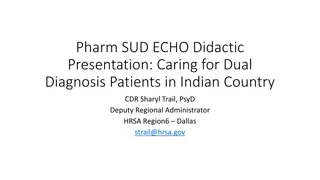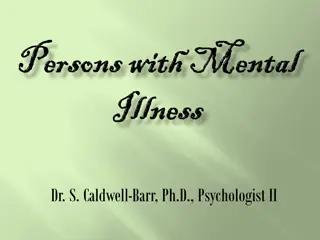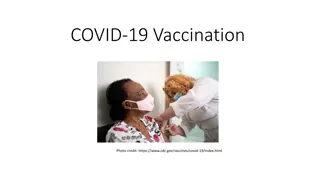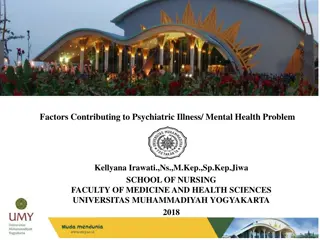Impact of Severe Mental Illness, Physical Comorbidity, and COVID-19 in South Asia
The research funded by the National Institute for Health Research aims to address the mortality gap and health inequalities faced by individuals with severe mental illnesses in South Asia. The study focuses on improving outcomes for mental and physical multimorbidity, reducing depression and anxiety, and developing research capacity in the region. By addressing these issues, the project strives to enhance overall health and well-being for individuals living with severe mental illness in the area.
Download Presentation

Please find below an Image/Link to download the presentation.
The content on the website is provided AS IS for your information and personal use only. It may not be sold, licensed, or shared on other websites without obtaining consent from the author.If you encounter any issues during the download, it is possible that the publisher has removed the file from their server.
You are allowed to download the files provided on this website for personal or commercial use, subject to the condition that they are used lawfully. All files are the property of their respective owners.
The content on the website is provided AS IS for your information and personal use only. It may not be sold, licensed, or shared on other websites without obtaining consent from the author.
E N D
Presentation Transcript
University of the Year for Student Experience (The Times/Sunday Times Good University Guide 2020) IMPACT: Severe mental illness, physical comorbidity and COVID-19 ISSR Panel: The Pandemic: Where are we now? Dr Jan R. Boehnke on behalf of the NIHR Global Health Research Group IMPACT in South Asia @IMPACT_NIHR @jrboehnke dundee.ac.uk Page 1
Improving Outcomes in Mental and Physical Multimorbidity and Developing Research Capacity (IMPACT) in South Asia. www.impactsouthasia.com dundee.ac.uk Page
Acknowledgement / Disclaimer This research was funded by the National Institute for Health Research (NIHR) (17/63/130) using UK aid from the UK Government to support global health research. The views expressed in this presentation/ publication are those of the author(s) and not necessarily those of the NIHR or the UK Department of Health and Social Care. dundee.ac.uk Page 3
Hosted by the University of York. Our goals are to: Improve health and reduce deaths associated with diabetes, heart and lung diseases in people living with severe mental illnesses Reduce depression and anxiety in people with chronic physical health conditions. dundee.ac.uk Page 4
www.impactsouthasia.com dundee.ac.uk Page 5
Background Severe mental illness: psychotic disorders, bipolar affective disorder, severe depression with psychotic symptoms Mortality gap of ~20 years compared to general population 1 2 Around 80% of deaths in people with SMI are due to preventable physical illnesses (cardio-metabolic, respiratory disorders, infectious diseases) 3 4 Majority of evidence for these health inequalities has been generated in high-income countries LMIC: even shorter life expectancy, and larger mortality gap 4 LMIC: physical comorbidity in SMI is at least as prevalent as in HIC 1 1. Liu et al., World psychiatry 2017;16(1):30-40. 2. Walker et al., JAMA psychiatry 2015;72(4):334-41. 3. Laursen, Schizophrenia research 2011;131(1-3):101-4. 4. Fekadu et al., The British journal of psychiatry 2015;206(4):289-96. dundee.ac.uk Page 6
Baseline survey Cross-sectional survey among patients with a clinical diagnosis of SMI: Bangladesh: National Institute of Mental Health and Hospital, Dhaka; offers 200 beds for in-patient care; 400 out-patients attend every day. India: National Institute of Mental Health and Neurosciences, Bengaluru; 650 beds for in-patient care; 400 out-patients attend every day. Pakistan: Institute of Psychiatry, Rawalpindi Medical University, a WHO collaborating centre for the Eastern Mediterranean (EMRO); offers 60 beds for in-patient care; 400 out-patients attend every day. Sample before lockdown measures came in force: 2506 participants have been recruited, of whom 2157 have consented to be contacted for future research and have provided a telephone contact. Zavala et al. protocol accepted for publication at BMJOpen. dundee.ac.uk Page 7
Data Collection Follow-up survey from baseline population Demographics, urban-rural, access to green space Mental health, access to mental healthcare, health-related quality of life Worries and concerns about COVID-19 Personal and household experience during the COVID-19 epidemic Knowledge and attitude and practice towards COVID-19 Information sources about COVID-19 Health risk behaviours Family support and isolation Financial and housing related issues Access to food Goal: To investigate the IMPACT of COVID-19 and the societal response in people with SMI in South Asia Wave 1 Wave 2 Bangladesh 09.05. 07.06. 11.07. 05.08. India 12.05. 11.06. 21.07. 07.08. Pakistan 16.05. 15.06. 16.07. 08.08. dundee.ac.uk Page 8
